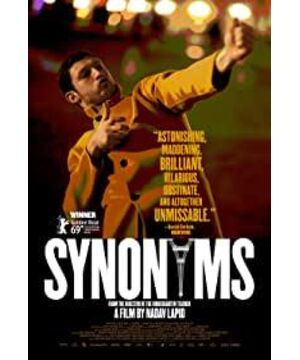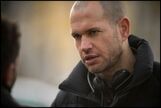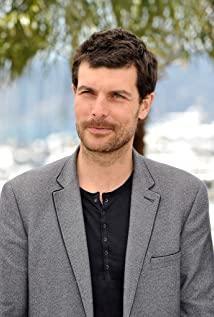The "Main Competition Award Results" at this year's Berlin Film Festival is still quite controversial.
"Synonyms," directed by director Nadav Rapid, won the Golden Bear for Best Film. When the film was screened at the film festival, many viewers in the daily screenings left the venue because of too many large-scale pictures. The audience response in the media field is also polarized. But in the end, he was able to win the grand prize, and it can be seen that the Berlin Film Festival judges are taking the road of "artistically bold, not conservative".
And this film, which is co-produced by Israel, Germany and France, has the advantage behind the scenes. The film's producer is Said bin Said, who is the leader of European and American art film circles, and the jury in Berlin this year is French actor Juliette Binoche. These behind-the-scenes non-artistic factors have also become the biggest factor. Controversial point.
Nadav Rapid's film is a favorite for lovers of restricted-level literary and artistic films. A large number of male nudity scenes, unabashed descriptions of private parts, and erotic scenes overflow the screen.
At the beginning of the film, the male protagonist Yoav was bathing naked in the house, but his accompanying clothes and luggage were stolen. At this moment, Yoyav is running in the dark naked, with the shaking camera, naked body, like a dancer, he uses his body to express his helplessness.
But the large scale is only an appearance, and Yoyav's nudes symbolize "rebirth". In a coma, Yoav was naked in the water like a baby with nothing. The victim was later found by a French couple, Emile and Caroline, who appeared to be "Christ descending" when the pair lifted him out of the bathtub.
As an Israeli outsider, Joyav has come under the scrutiny of the French. When Ameler said, "He was circumcised," his Jewishness could no longer be hidden.
However, for this film, eroticism is just a coat, which is wrapped in a symbol of identity.
Emily and Caroline were given clothes, food and shelter. They educated him and tried to make him part of this city, this society. For Joyav, this couple is a gap that opens the door to France. On the calm and beautiful banks of the Seine, Yoyaf's long-suppressed emotions finally broke out. He described the Israel in his eyes to Ameler with a dozen rude words such as ignorance, obscenity, and filth. Ameler calmly said to Joyaf: No country can be described by so many synonyms at the same time.
This also indicates that there is an insurmountable gap between people living in different classes and races, and they cannot understand each other. This nameless and incomprehensible emotion of "anger" pushes the plot to a climax.
In fact, this is the routine of "Synonyms" to transcend the issue of race, and the overtones slanted out of the sidelines. Young Joav came to Paris with anxiety about his identity. Every minute and every second he walked in the streets and alleys of Paris, he was on a spiritual journey of purgatory. It was difficult for him to admit that he was an Israeli in his heart. He wanted to change his identity by refusing to speak Hebrew, and he didn't even want to meet his father again. He tried to cut off all ties between him and Israel in an extreme way. Escape from an "Israeli Fate".
The film itself knows this, and it is absurd irony to use the name of a synonym. How closely synonymous is Israel and France, yet its diversity shows how hard it is for outsiders to move. At the same time, this is also a critical film, and the "irrational thinking" of the protagonist Joav points to Israel's nationalism and blind patriotism.
Maybe "Synonyms" would be a little more convincing if it reverted to a redemptive movie with a bit of a national twist. On the surface, the French couple beside Joyav ostensibly extended a helping hand to him, but in fact they were taking advantage of Joyav's interracial cultural background. Joyaf's tragic experience in the army in the past is an excellent subject for Emily's writings, and even Joyaf's figure comparable to Rome has become Caroline's daily lustful target. But Yoav's endless giving has given it an absurd beauty.
Director Nadav Rapid is sounding the alarm for us: the exotic elements of Yoyav are the attraction, and the essence of language is not at all interested. The serious "France and immigration problem" still exists, and even with the temporary acceptance of the French, Joyav cannot be immune to it. And these questions are projected by the director into this French love triangle.
Therefore, in "Synonyms", there is no cruelty and darkness. Instead, there is a thriving French culture on the surface, and Yoav has worked hard along the way but has not changed the status quo. Write heavy in absurd ways. For example: Yoyav's colleague Yahon nervously hummed the Israeli national anthem to passengers on the subway, actively revealing his identity, which embarrassed Joyav.
The violent nationalist Yahong wrestled in the office, while Yoyaf encouraged the two to beat each other; these all pointed to their inner dissatisfaction and unprovoked conflict.
Later, in a "resistance to French neo-Nazism", Yahon exposed his rioting attempts. After his death, he was dragged outside the car to show everyone. Ahon's fate was the "Israeli-style fate" that Joyav was trying to escape, but he and Ahon did it in different ways. One is violent, the other is submissive, but Yoyav's own ending has become a mystery.
Yahon's death had a great impact on Jolav, who continued Yahon's high spirits, allowing national collectivism to revive in his body. Jolav, who returned to the embassy, saw the Israeli compatriots waiting in line in the rain. He shouted "forget the border" and wanted to put them in the embassy, but was finally stopped by the staff, which turned into a farce .
Of course, Jolav also paid the price of unemployment. With no job and no money to buy food, Jolav roams the streets like a ghost. Then he walked into a nightclub and he came to the dance floor to squeeze through the crowd and found a loaf of bread on the floor. In order to eat this piece of bread decently, he pretended to be a part of the carnival, using the bread as a prop to hide his hunger.
Most of the "heavy" in the movie is done in an understatement. Jolav's trip to France is really like a trip. The country and body in which he is currently living are not in harmony, and many factors make it difficult to integrate into it.
He still had to take the job that Emile introduced him to, to do mannequins for an unknown place. The erotic director was so perverted that he made Jolav make all kinds of embarrassing actions. He even made Jolav lie down naked and describe himself in Israeli language.
I don't think there is any essential difference between him who was forcibly stripped by the artist or who was having fun with Caroline. Jolav's body was in an extremely obscene state, and these Frenchmen objectified Jolav and pushed Jolav to the brink of collapse.
At the end of the film, Jolav, who has been depressed for a long time, came to the concert of "girlfriend" Caroline to vent his dissatisfaction. Facing the Parisians who played the tune in silence, without a trace of response, he finally realized that no one really cared about his feelings from beginning to end. The differences in race and class cannot be eliminated, and it is difficult for him to integrate in his own way.
In the end, Caroline and the musicians gracefully continued on the stage to perform movements that only "Parisians" can understand. Jolav was never accepted by anyone. He is full of enthusiasm but always wishful thinking, which further confirms the hypocritical and inclusive attitude of the French and the increasingly cruel reality in Europe.
Such a kind of struggle instead of showing goodwill. Director Dave Lapid used an avant-garde and bold way to explore new frontiers. The Golden Bear Awards judges are bound to appreciate it. This is the Berlin Film Festival's selection rules in line with the times. Progress is also the time of the times
View more about Synonyms reviews









